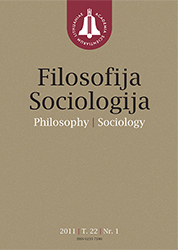Subjektyviosios gerovės sąvokos struktūros taikymo empiriniuose tyrimuose rezultatų nuoseklumas
Application consistency of the structure of subjective well-being concept in empirical research
Author(s): Artūras GataūlinasSubject(s): Social Sciences
Published by: Lietuvos mokslų akademijos leidykla
Keywords: consistency of subjective well-being data; satisfaction component of subjective well-being; affect component of subjective well-being; former command economy region; Southern Europe region; traditional market economy region
Summary/Abstract: Subjective well-being research represents a new direction in social science and recently is being widely analysed among sociologists, economists and psychologists. We could look at the subjective well-being research from a historical perspective of its origin. Until the last decades of XX century, well-being was most commonly perceived in the sense of income and wealth, that is, in its objective sense. Income and wealth has a rich history of research and well developed methods. Currently the perception of well-being is extended in order to include its subjective element, which represents an individual’s subjective reaction towards objective circumstances of life. Being a new turn in wellbeing research, it needs to be checked for the application consistency of the structure of the subjective well-being concept from the standpoint of existing empirical data. The purpose of this article is to assess the consistency of application of the concept of subjective well-being in empirical research based on the European Values Study and the European Social Survey data of EU countries. It is possible to conclude that there is a clearly developed structure of the subjective well-being, which consists of cognitive and affective appraisals of life. Cognitive appraisal represents a comparison of individual’s life with the standard of good life, and in turn, affective appraisal represents emotions and mood which an individual experiences in his / her life. This structure is implemented in the questionnaires of the European Values Study and the European Social Survey. The empirical results of those three databases are consistent in such a way that it is possible to see a clear division of regions in the context of EU. It is possible to distinguish former command economy countries, which possess lower average subjective well-being than the EU average. The same trend is prevalent in some EU countries of Southern Europe. The opposite trend is observable in traditional market economy countries, where the average subjective wellbeing is higher than the EU average. The former command economy region includes such countries as Lithuania, Latvia, Estonia, Poland, Czech Republic, Slovak Republic, Hungary, Bulgaria, Romania, Slovenia. Slovenia has the double situation. On the one hand, it belongs to the command economy countries, on the other hand, it belongs to the UN Southern Europe region. But in this article it is counted as it would belong to the former command economy region. Southern Europe region in this article includes EU countries classified as Southern Europe according to the UN classification (except Slovenia).
Journal: Filosofija. Sociologija
- Issue Year: 2012
- Issue No: 4
- Page Range: 246-255
- Page Count: 10
- Language: Lithuanian

